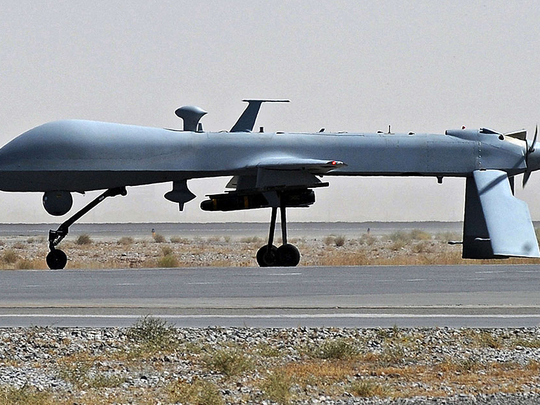
Damascus: Syria’s military shot down a US drone over the coastal province of Latakia, a stronghold of President Bashar Al Assad, state media said on Tuesday.
The US military confirmed that it had lost communication with an unarmed Predator drone over northwest Syria on Tuesday and was looking into the claims it was brought down.
If confirmed, it would be the first time that Syrian forces have attacked a US aircraft since the coalition fighting Daesh began raids against the group in Syria in September.
The claim came as activists said Syrian regime forces had carried out an attack using chlorine gas that killed six people, including three children.
Syrian state news agency Sana reported the apparent downing of a US drone in a breaking news alert.
“Syrian air defences brought down a hostile US surveillance aircraft over north Latakia,” it said, without providing further details.
While Syria is not participating in the air strikes against Daesh, it has so far refrained from taking action against aircraft involved in the US-led coalition’s operations to take out the extremist group.
Damascus has said it was given prior warning before the coalition began the strikes, and Foreign Minister Walid Muallem said last year that Washington had pledged its raids would not hit the Syrian army.
The strikes in Syria have largely been focused on Aleppo and Raqa provinces, where the Daesh has strongholds.
But the campaign has also targeted the group elsewhere, and hit positions believed to belong to fighters affiliated with Al Nusra Front, the feared Syrian wing of Al Qaida.
Daesh fighters have been largely absent from the northwestern province of Latakia, according to the Syrian Observatory for Human Rights, a Britain-based monitor.
But Al Nusra fighters are active in the province, which is home to the Al Assad family’s ancestral village and is a bastion of the Alawite sect of Shiite Islam to which the president belongs.
According to the Observatory, the strikes have killed more than 1,600 people, most of them militants.
Elsewhere in war-ravaged Syria, activists and the Observatory reported at least six people had been killed in an alleged regime gas attack.
The overnight incident in Idlib, in the northwest, prompted outrage from rights group Amnesty International, which said it was further evidence of government “war crimes.”
“Three children, their mother and father, and their grandmother suffocated to death after regime barrel bomb attacks,” the Observatory said.
The monitor said doctors in the village of Sarmin, southeast of Idlib city, concluded that the manner of death indicated a gas, possibly chlorine, had emitted from the barrel bombs.
Activists in Sarmin said chlorine gas had been used and posted videos of a chaotic field hospital where disoriented victims coughed and held gas masks over their faces as children cried in the background.
A paramedic said first responders rushed to the scene unprepared.
“This is the first time we’ve experienced a poison gas attack,” Motea Jalal said.
“We grabbed the masks we had. They are for fires, not for gas attacks, but that’s what is available.”
He said paramedics retrieved the wounded and tried to wash the chemicals from the bodies, adding that more than 100 people were in need of treatment.
The Organisation for the Prohibition of Chemical Weapons said in January it had “confidence” that chlorine gas had been used in attacks on three villages in 2014.
It did not assign responsibility, but its report noted that witnesses heard helicopters before the attack, which only government forces possess.












